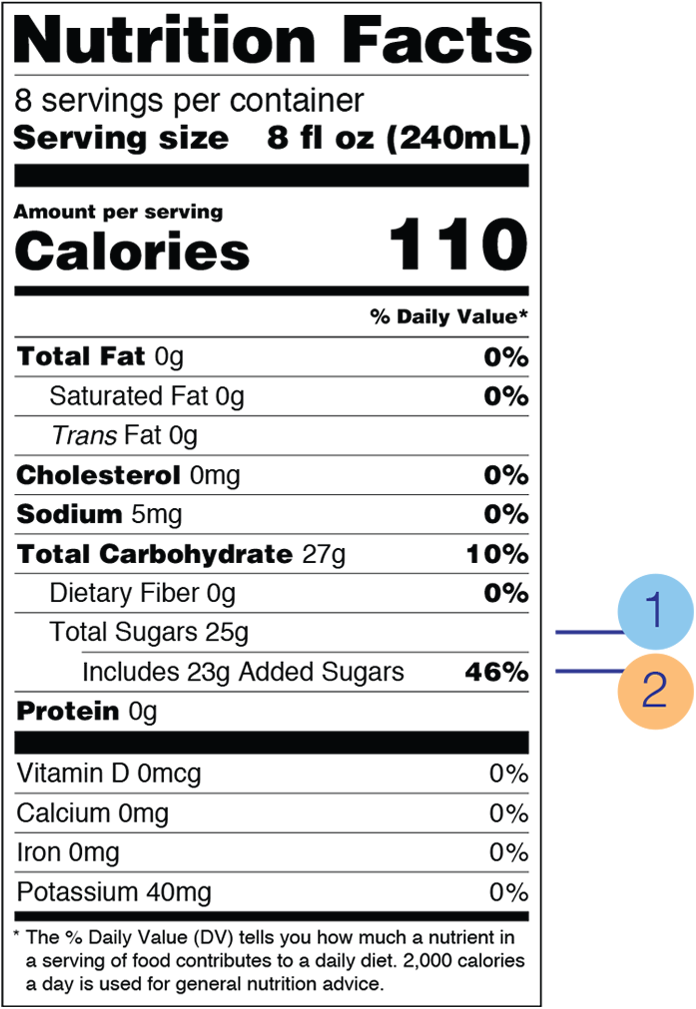KBI Official Guidance – Added Sugars & Nutrition Panel Changes
Based on the rules put forth by the FDA effective July 26, 2016, commercial Kombucha producers in the United States are required to indicate the sugar they add to the fermentation process as “Added Sugars.” However, the amount required to put on the label is AFTER fermentation has occurred. To be in compliance with this […]
Based on the rules put forth by the FDA effective July 26, 2016, commercial Kombucha producers in the United States are required to indicate the sugar they add to the fermentation process as “Added Sugars.” However, the amount required to put on the label is AFTER fermentation has occurred.
To be in compliance with this rule, it is advised that Kombucha producers in the United States submit their products to a third party lab for sugar testing.
Clear records and scientific documentation that demonstrate the accurate amount of sugar grams in the final products along with a narrative of why the amount is different than the starting sugar are required to be kept on file.
Any Kombucha producer that adds juice concentrate, sugar or sugar substitutes to their final product would need to also include that information as part of the “Added Sugars” amount on the label.
RECAP:
- The amount of sugars present must be declared as both TOTAL and ADDED sugars (21 CFR 101.9(c)(6)(iii)).
- Added sugars may not exceed the Total sugars amount listed on the label.
- Added sugars = the amount of sugar remaining in the product AFTER fermentation.
- Clear documentation and narrative are kept on file and provided upon request.
- Any other sugars added in the flavoring stage are also to be included as ADDED SUGAR
- sugars (free, mono- and disaccharides) (this would included fructose, sucrose, and glucose)
- sugars from syrups and honey
- sugars from concentrated fruit or vegetable juices that are in excess of what would be expected from the same volume of 100 percent fruit or vegetable juice of the same type
EXAMPLE:
- 15g of sugar are measured in the sweet tea substrate before fermentation
- The product is tested after fermentation and has reduced to 12g of sugar
- The label now reads:
- Total Sugar 12g
- Added Sugar 12g
The new rules put forth by the FDA regarding added sugars are listed here for reference (important details bolded by KBI):
- Requiring the declaration of the gram amount of “added sugars” in a serving of a product, establishing a Daily Reference Value (DRV), and requiring the percent Daily Value (DV) declaration for added sugars;
- Changing “Sugars” to “Total Sugars” and requiring that “Includes `X’ g Added Sugars” be indented and declared directly below “Total Sugars” on the label;
- The rule requires a manufacturer with sugars added before and during the fermentation process to make and keep records of added sugars necessary to determine the amount of added sugars present in the finished food. The rule requires manufacturers of such foods to make and keep records of all relevant scientific data and information relied upon by the manufacturer that demonstrates the amount of added sugars in the food after fermentation and a narrative explaining why the data and information are sufficient to demonstrate the amount of added sugars declared in the finished food, provided the data and information used is specific to the type of fermented food manufactured.
- Establishing a compliance date of 2 years after the final rule’s effective date (7/26/16), except that manufacturers with less than $10 million in annual food sales have a compliance date of 3 years after the final rule’s effective date. (For more details, see part III.)
ALL BRANDS WILL NEED TO BE IN COMPLIANCE WITH THIS LABEL CHANGE
Example of where Added Sugars to be noted on label:
RECOMMENDED NARRATIVE TO KEEP WITH SCIENTIFIC RECORDS
Kombucha is a traditionally fermented beverage made of tea, sugar and SCOBY. Throughout the fermentation process, the sugar added at the beginning is consumed by the microorganisms in the SCOBY and is reduced over time in two ways. Cane sugar is sucrose, a disaccharide. Initially, the yeast split the sugar molecule into its monosaccharide components, fructose and glucose. Primarily, this results in a lower glycemic impact to the consumer because the complex carbohydrates are broken down into simpler sugars. Secondarily, the amount of sugar remaining is also reduced the longer the fermentation continues. The byproducts of this process are converted into organic acids giving Kombucha is unique flavor and properties.
CHANGES TO THE NUTRITION FACTS LABEL
In an effort to provide additional time to comply with the new Nutrition Facts Panel and Supplement Facts Panel regulations, FDA has announced that, for the first six months following the January 1, 2020 compliance date, FDA plans to work cooperatively with manufacturers to meet the new requirements and will not focus on enforcement actions regarding these requirements. For more information, go to https://www.fda.gov/food/food-labeling-nutrition/industry-resources-changes-nutrition-facts-label#Compliance.
REFERENCES:
https://www.fda.gov/media/102614/download
https://www.fda.gov/food/food-labeling-nutrition/changes-nutrition-facts-label
Help Your Patients Use the Nutrition Facts Label to Cut Down on Added Sugars
REVISIONS:
Rev.120617 Approved KBI Board December 2017
Updated 022218 to clarify types of sugars that need to be classified as “Added Sugar”
Updated 080719 to list example and clarify Added Sugars may not exceed Total Sugars on label
Update 102919 to add Nutrition Facts Panel and Supplement Facts Panel regulations
Update 071123 to update image of where Added Sugars go on the Nutrition Panel

